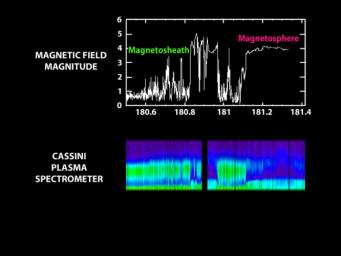
|
Entering the Magnetic Bubble
- Click the image above for a larger view
- Full-Res JPEG (720 x 540) (36.9 kB)
- Full-Res TIFF (720 x 540) (244.3 kB)
Caption:
This graph illustrates the Cassini spacecraft's transition into Saturn's magnetosphere from an outer region called the magnetosheath. A magnetosphere is a magnetic envelope of charged particles that surrounds some planets, including Earth. In between it and a boundary called the bow shock -- where solar winds bend to avoid the magnetosphere -- is an area called the magnetosheath.
These data (bottom panel) were taken by Cassini's plasma spectrometer, which measures the energy and electric charge of particles such as protons and electrons. In this graph, the color green represents the highest intensity particles. The top panel shows the strength of the magnetic field as measured by the dual technique magnetometer instrument on Cassini. The field intensified as Cassini entered the magnetosphere.
Background Info:
The Cassini-Huygens mission is a cooperative project of NASA, the European Space Agency and the Italian Space Agency. The Jet Propulsion Laboratory, a division of the California Institute of Technology in Pasadena, manages the Cassini-Huygens mission for NASA's Office of Space Science, Washington, D.C. The Cassini orbiter and its two onboard cameras were designed, developed and assembled at JPL. The imaging team is based at the Space Science Institute, Boulder, Colo.
For more information, about the Cassini-Huygens mission visit, http://saturn.jpl.nasa.gov . For more information about the Cassini plasma spectrometer team's home page, visit http://caps.space.swri.edu/ and the dual technique magnetometer team's home page, http://www.imperial.ac.uk/research/spat/research/cassini/ .
Cataloging Keywords:
| Name | Value | Additional Values |
|---|---|---|
| Target | Saturn | |
| System | Saturn | |
| Target Type | Planet | |
| Mission | Cassini-Huygens | |
| Instrument Host | Cassini Orbiter | |
| Host Type | Orbiter | |
| Instrument | Magnetometer | Radio and Plasma Wave Science Instrument (RPWS) |
| Detector | ||
| Extra Keywords | Color, Magnetosphere | |
| Acquisition Date | ||
| Release Date | 2004-07-01 | |
| Date in Caption | ||
| Image Credit | NASA/JPL/Southwest Research Institute/Imperial College London | |
| Source | photojournal.jpl.nasa.gov/catalog/PIA06348 | |
| Identifier | PIA06348 | |
